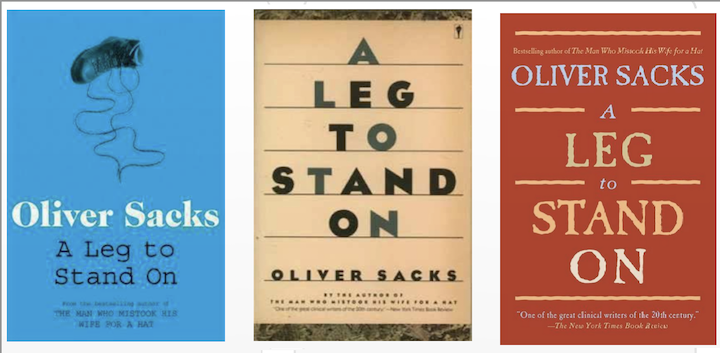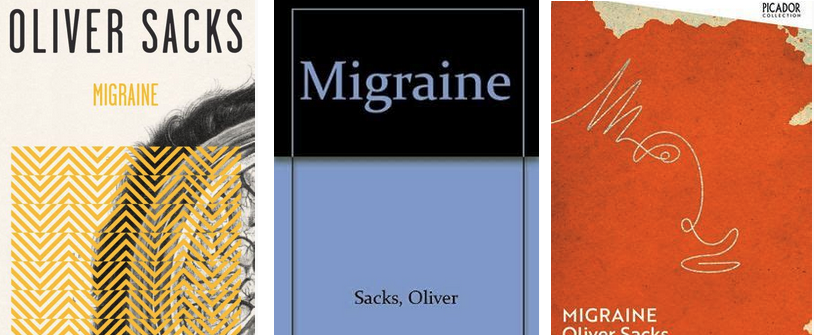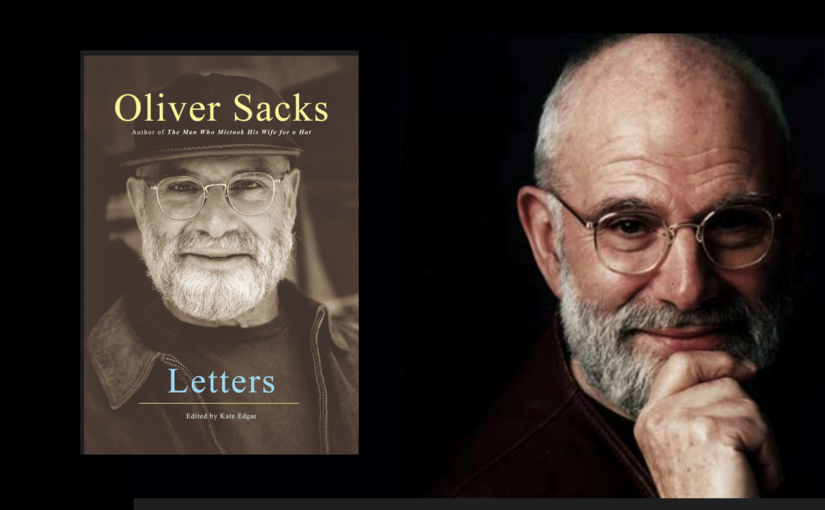June 2024
The 19th volume we’ve read in the increasingly poorly named Essay Project, this being (another) book that does not contain essays. But we’ve become fascinated by O.S. from reading his two autobiographies and the edited collection of his letters, and just can’t stop.
This is the third book that Sacks published (1984), following Migraine and Awakenings. So far (just at chapter 3 when writing this), it seems to be the book where he found his narrative voice, or at least the voice that proved so engaging to non-medical readers. It strikes me as a breakthrough in his writing style. It is a gripping narrative, with lucid and beautiful writing. Gone are the clinical passages and case histories that were interspersed throughout his first two books. It will be interesting to see if his subsequent ‘neurographies’ continue in this more narrative and engaging voice.
This book begins with an accident in 1974 in which O.S. nearly died, severely injured his leg and, during his recovery, experienced very odd neurological ‘side effects.’ The book discusses both the neurological issues, but also leads him to reflect on the state of institutional medical care, and — from his new vantage point as a patient — the relationship between physician and patient.
C1: The Mountain
Sacks hikes up a mountain in a remote area of Norway; he believes he is the only person within 10 miles. Part way up he encounters a gated fence and a sign that says “Beware of the Bull.” He ignores it and proceeds.
A couple miles farther up the mountain he rounds a rock and encounters the bull:
It had a huge horned head, a stupendous white body and an enormous mild milk-white face. It sat unmoved by my appearance, exceedingly calm, except that it turned its vast white face up towards me. And in that moment, in my terror, it changed, before my eyes, becoming transformed from magnificent to utterly monstrous. The huge white face seemed to swell and swell, and the great bulbous eyes became radiant with malignance. The face grew huger and huger all the time, until I thought it would blot out the universe. The bull became hideous-hideous beyond belief, hideous in strength, malevolence and cunning. It seemed now to be stamped with the infernal in every feature. It became, first a monster, and now the Devil.
Oliver Sacks, A Leg to Stand On, p. 5-6
He panics “and runs heedlessly down the mountain “and I ran for dear life-ran madly, blindly, down the steep, muddy, slippery path, lost here and there in patches of mist. Blind, mad panic! —there is nothing worse in the world-nothing worse, and nothing more dangerous.” He has no memory of the accident, but regains consciousness at the bottom of a cliff. His left leg is badly injured. He assesses the situation and realizes that if he is not able to get back down the mountain he will die of exposure when night comes.
He manages to splinter his leg with an umbrella and begins to drag himself down the mountain. He tries to call for help, but falls into a panic again, believing he may have attracted the bull and hides. Nothing happens. He recovers and continues making his way down. Evening comes, and he can see the villiage he left from far below, and realizes he will not make it. Then, ten minutes before total darkness arrives, he hears a yodel and is rescued by a shepherd and his son. They care for him, summon help from the village, and he is rescued.
ADD NOTE ON HIS PAYCHOLOGACAL STATE DURING THUS TIME.
C2: Becoming a Patient
Sacks is taken to a very small hospital. It is decided that he should return to London for surgery on his leg. But while he is in the small hospital he has an amazing experience.
I immediately fell asleep again, and slept soundly and well until a most amazing apparition entered the room, so that I rubbed my eyes thinking I was still dreaming. A young man-dressed, preposterously, in a white coat, for some reason came in dancing, very lightly and nimbly, and then pranced round the room and stopped before me, flexing and extending each leg to its maximum like a ballet dancer. Suddenly, startlingly, he leapt on top of my bedside table, and gave me a teasing elfin smile. Then he jumped down again, took my hands and wordlessly pressed them against the front of his thighs. There, on either side, I felt a neat scar.
“Feel, yes?” he asked. “Me too. Both sides. Skiing … See!” And he made another Nijinski-like leap.
Of all the doctors I had ever seen, or was later to see, the image of this young Norwegian surgeon remains most vividly and affectionately in my mind, because in his own person he stood for health, valor, humor-and a most wonderful, active empathy for patients. He didn’t talk like a textbook. He scarcely talked at all he acted. He leapt and danced and showed me his wounds, showing me at the same time his perfect recovery. His visit made me feel immeasurably better.
–ibid., 27
Sacks is transported to London and has a disillusioning experience with the dehumanizing bureaucracy if the hospital. Before and after the surgery he has a disappointing experience with the surgeon, though the nurse is kind. He discovers that his injured leg is unnaturally flaccid and that he can neither move nor feel it. The PT person is horrified, as is he, but the surgeon ignores his concerns. As time progresses he loses the sense that the leg even belongs to him; he cannot imagine it or imagine how to tense its muscles or otherwise control it. He finds this experience bizarre and terrifying. Thus ends chapter 2.
Views: 0


